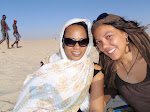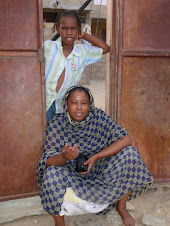Monday, April 13, 2009
The Almost-Horror Stories
Tock, tock, tock. A sound like the quick steady beat of a drum. If you hear this noise walking at night in Mauritania you better run for cover, for that is the noise that precedes a deadly animal. I sat with Fatou and M’Bourel after dinner one night chatting about scary stories and they definitely delivered. Fatou, who loves to talk, had a serious face as she told the tale of the “tocking” noise.
“If you see it, it will kill you. And it moves very fast, so you have to run from the sound and hide.” She said.
“Well, what is it!?” I asked, waiting for a monstrous description.
“A one-legged white horse.” She responded.
“………what?” I asked, feeling a flutter of laughter and confusion fill my chest.
“NO!” She said, seeing the smile on my face. “It’s so scary!”
I have to admit that it is slightly creepy; a one-legged horse hopping through the streets, killing those who witness its miraculous movements. I now wonder, observing the dead silence of a Mauritanian night in my village, if these kinds of stories scare people into their houses. Fatou said that she has known this story since she was a child, and has other stories as well. Most of the stories have a lesson at the end – which seems to be “Do not, for God’s sake, walk around alone at night”. Another story she added to this fabulous collection was one of a chicken. If you are walking alone at night and no one else is around (see…) and come across a chicken sitting in dust, that chicken will kill you. Do I see a theme?
But, not all Mauritanian horror stories involve chickens and one-legged horses. I went to Nouakchott with Fatou and got to meet her amazing family. One sister in particular stuck out to me – Salla. She is my age, 24, and is one of the few Mauritanians that has passed the BAC and continued onto University. She studies in the English Department and has a dream to be a journalist, reporting news on TV. I sat with her one night as she cooked, holding a flashlight because the power in their house was cut. Her bright smile alone was enough to light the room. She worked the mortar and pestle in rhythmic tocks and told me about her life. Salla has a beautiful soul. She genuinely cares for people and gives her personal best for others. She has been married for two years, yet, hasn’t seen her husband for at least a year and a half. He is currently in France, working at a hotel. She talks to him rarely, so rarely in fact she’s too embarrassed to say. She told me of a conversation with him a year ago, where he instructed her to quit her job and focus on her studies. There was a tint of jealousy for her husband mixed into this request. Salla was working at a hotel at that time in Nouakchott and he didn’t like the idea of having her “displayed” at the desk for all to see. “He was right,” she told me. “I did need to focus on studies, but I loved my job – and it was money for the family. He promised me he would send money from France, but... I have yet to see it.” She motioned toward the light-bulb above, cold and dark.
She told me that in Mauritania, marriage is a very difficult thing. Marriage very young is not uncommon, mostly because people want to respect their religion and marry before sex, but as a result the rates of separation and divorce are tremendous. The rules of relationships are not as strict for men, and courting others shortly after a first marriage is rather normal. Salla told me that polygamy (Muslims are able to take 4 wives) just doesn’t work in this time. It is difficult nowadays to support just one family – to feed, clothe and nurture children from several families is close to impossible. Men still take their opportunity, and too often one family is left with bare bones. Salla is afraid of this happening. She is afraid that her husband will find another wife and refuse to divorce her. Now she must deal with the emptiness and loneliness independently. Marriage problems are subjects that aren’t talked about. “My mom doesn’t even know how I feel...” She told me, stirring a pot of stewing tomatoes. “And if my friends ask if I have talked to him recently, I have to say yes. I have to convince people everything is ok. It’s just the culture.” She told me that she is already judged all the time for not having a child yet. “It’s really frustrating, you know.” She growled shaking her spoon in the air. “I’m sorry… I’m saying too much – you don’t want to know all this. I just haven’t talked to anyone about it.”
I helped her finish up in the kitchen nook and ate her delicious food. When I left the next day I made a mental note to call her to check in once in a while. She promised to take me by the University next time I’m in Nouakchott to see what it’s like. “It’s not,” She said with a laugh. “Like your American schools, but it’s the best… and only one we have.” As I hugged her goodbye and gave her an extra squeeze and looked her in the eye and told her I thought she was doing a great job. It’s sad see such a beautiful soul so stretched by cultural norms. That’s horror enough for me.
Back in Aleg, I walked back to my house one night after visiting friends to find the family beginning to set up their sleeping mats on the ground outside. I walked in to greet Fatou and peeked into her room.
“You walked back by yourself? Alone? At night?” She asked, eyes slightly widened.
“Yes, but don’t worry Fatou, no chickens in the road tonight.” I said.
She smiled as she welcomed me into her room.
“If you see it, it will kill you. And it moves very fast, so you have to run from the sound and hide.” She said.
“Well, what is it!?” I asked, waiting for a monstrous description.
“A one-legged white horse.” She responded.
“………what?” I asked, feeling a flutter of laughter and confusion fill my chest.
“NO!” She said, seeing the smile on my face. “It’s so scary!”
I have to admit that it is slightly creepy; a one-legged horse hopping through the streets, killing those who witness its miraculous movements. I now wonder, observing the dead silence of a Mauritanian night in my village, if these kinds of stories scare people into their houses. Fatou said that she has known this story since she was a child, and has other stories as well. Most of the stories have a lesson at the end – which seems to be “Do not, for God’s sake, walk around alone at night”. Another story she added to this fabulous collection was one of a chicken. If you are walking alone at night and no one else is around (see…) and come across a chicken sitting in dust, that chicken will kill you. Do I see a theme?
But, not all Mauritanian horror stories involve chickens and one-legged horses. I went to Nouakchott with Fatou and got to meet her amazing family. One sister in particular stuck out to me – Salla. She is my age, 24, and is one of the few Mauritanians that has passed the BAC and continued onto University. She studies in the English Department and has a dream to be a journalist, reporting news on TV. I sat with her one night as she cooked, holding a flashlight because the power in their house was cut. Her bright smile alone was enough to light the room. She worked the mortar and pestle in rhythmic tocks and told me about her life. Salla has a beautiful soul. She genuinely cares for people and gives her personal best for others. She has been married for two years, yet, hasn’t seen her husband for at least a year and a half. He is currently in France, working at a hotel. She talks to him rarely, so rarely in fact she’s too embarrassed to say. She told me of a conversation with him a year ago, where he instructed her to quit her job and focus on her studies. There was a tint of jealousy for her husband mixed into this request. Salla was working at a hotel at that time in Nouakchott and he didn’t like the idea of having her “displayed” at the desk for all to see. “He was right,” she told me. “I did need to focus on studies, but I loved my job – and it was money for the family. He promised me he would send money from France, but... I have yet to see it.” She motioned toward the light-bulb above, cold and dark.
She told me that in Mauritania, marriage is a very difficult thing. Marriage very young is not uncommon, mostly because people want to respect their religion and marry before sex, but as a result the rates of separation and divorce are tremendous. The rules of relationships are not as strict for men, and courting others shortly after a first marriage is rather normal. Salla told me that polygamy (Muslims are able to take 4 wives) just doesn’t work in this time. It is difficult nowadays to support just one family – to feed, clothe and nurture children from several families is close to impossible. Men still take their opportunity, and too often one family is left with bare bones. Salla is afraid of this happening. She is afraid that her husband will find another wife and refuse to divorce her. Now she must deal with the emptiness and loneliness independently. Marriage problems are subjects that aren’t talked about. “My mom doesn’t even know how I feel...” She told me, stirring a pot of stewing tomatoes. “And if my friends ask if I have talked to him recently, I have to say yes. I have to convince people everything is ok. It’s just the culture.” She told me that she is already judged all the time for not having a child yet. “It’s really frustrating, you know.” She growled shaking her spoon in the air. “I’m sorry… I’m saying too much – you don’t want to know all this. I just haven’t talked to anyone about it.”
I helped her finish up in the kitchen nook and ate her delicious food. When I left the next day I made a mental note to call her to check in once in a while. She promised to take me by the University next time I’m in Nouakchott to see what it’s like. “It’s not,” She said with a laugh. “Like your American schools, but it’s the best… and only one we have.” As I hugged her goodbye and gave her an extra squeeze and looked her in the eye and told her I thought she was doing a great job. It’s sad see such a beautiful soul so stretched by cultural norms. That’s horror enough for me.
Back in Aleg, I walked back to my house one night after visiting friends to find the family beginning to set up their sleeping mats on the ground outside. I walked in to greet Fatou and peeked into her room.
“You walked back by yourself? Alone? At night?” She asked, eyes slightly widened.
“Yes, but don’t worry Fatou, no chickens in the road tonight.” I said.
She smiled as she welcomed me into her room.
Subscribe to:
Posts (Atom)




